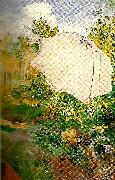Wholesale Oil Painting No Minimum |
|||||||||||
|
|
|||||||||||

|
|||||||||||
|
|
|
||||||||
Carl LarssonSwedish Realist Painter, 1853-1919 Swedish painter, illustrator and printmaker. He came from a poor family and studied (1866-76) at the Konstakademi in Stockholm, supporting himself throughout this period. From 1871 to 1878 he contributed illustrations to the comic journal Kaspar and the Ny illustrerad tidning. From 1875, for several decades, he was a prolific book illustrator, his most renowned work in this field being his drawings for Föltskärns beröttelser ('The Barber-surgeon's tales'; pubd 1883-4) by Zacharius Topelius, and the Rococo-inspired watercolours for the Samlade skaldeförsök ('Collected attempts at poetry'; pubd 1884) by the 18th-century Swedish author Anna Maria Lenngren. |
||||||||
|
|
||||||||
tradgard i grez
tradgard i grez Painting ID:: 66328 |
olja pa duk 1883
se olja pa duk 1883 se |
|||||||
|
|
||||||||
|
Nils Kreuger Swedish, 1858-1930,Swedish painter, draughtsman and illustrator. From 1874 he studied at the Konstakademi in Stockholm, where he soon became a friend of Richard Bergh and Karl Nordstrem, both of whom were later prominent exponents of the more advanced Swedish painting of the 1880s and 1890s. After being forced to interrupt his studies because of illness, Kreuger trained from 1878 at the art school of Edvard Perseus (1841-90) in Stockholm before he travelled to Paris, where he stayed for the most part until 1887. He made his d?but at the Paris Salon in 1882, and he also resided in the artists' colony in Grez-sur-Loing. During this period he painted such works as Old Country House (1887; Stockholm, Nmus.) with a free brushwork and sense of light that owed much to Jules Bastien-Lepage. In 1885 Kreuger was active in organizing the Opponenterna, a protest movement led by Ernst Josephson against the conservative establishment of the Konstakademi in Stockholm, and the following year he helped to found the Konstn?rsf?rbund (Artists' Union). Like the majority of the Konstnersferbund's members, Kreuger abandoned the French-inspired plein-air realism of the 1880s for symbolically coloured National Romanticism in the 1890s. For Kreuger this change took place between 1893 and 1896 in Varberg on the west coast of Sweden, where, together with Bergh and Nordstrem, he founded the Varberg Group. Drawing on Paul Gauguin's Synthetism, the group contributed to the formation of the National Romantic style of the 1890s in Sweden. Kreuger's encounter with van Gogh's drawings at an exhibition in Copenhagen in 1893 also played a decisive role in his development. He devised an intensely personal style in which the landscape was composed in large blocks that were then covered by a pattern of directional lines and dots in India ink (somewhat in the manner of van Gogh's late landscape drawings) to bring out the painting's colour values and create an effect of decoratively stylized forms: for example Spring in Halland (1894; Stockholm, Nmus.). Kreuger was also a prolific draughtsman and illustrator. tradgard i grez 1883 se |
||||||||
|
|
||||||||
|
Prev Next
|
||||||||
|
|
||||||||
|
Related Paintings to Nils Kreuger :. |
||||||||
|
|
||||||||
|
CONTACT US |

